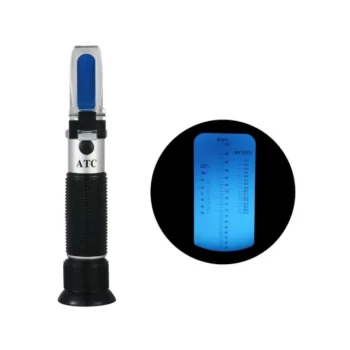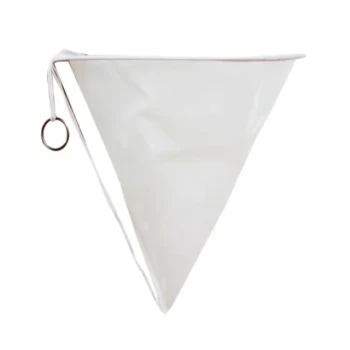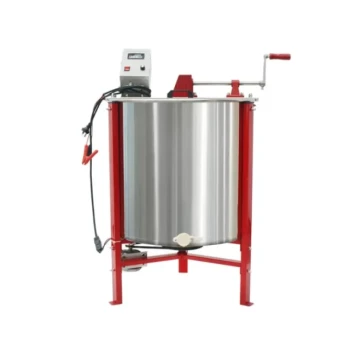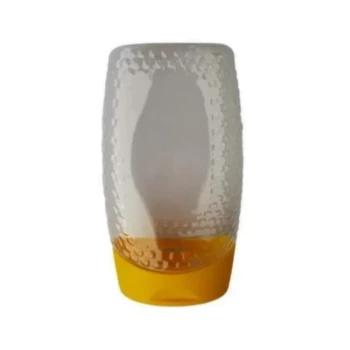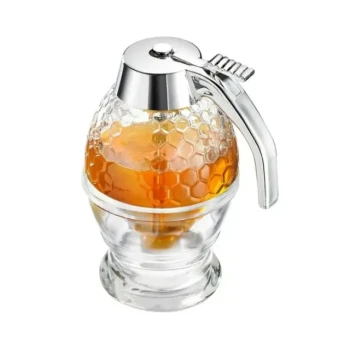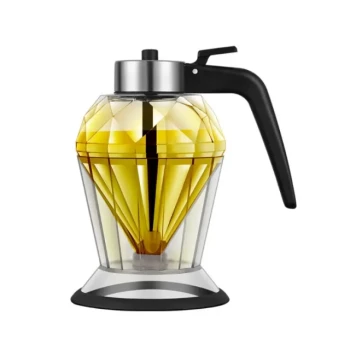The key nutrients in honey most affected by temperature are its natural enzymes, antioxidants, and beneficial plant compounds like flavonoids. While honey is remarkably stable, these delicate components are easily damaged or destroyed by heat, which significantly diminishes its unique health-promoting properties and turns it into little more than a simple sweetener.
The core issue is a trade-off between convenience and nutritional integrity. Heating honey makes it easier to process and keeps it liquid, but this process irreversibly destroys the very enzymes and antioxidants that are central to its health benefits.
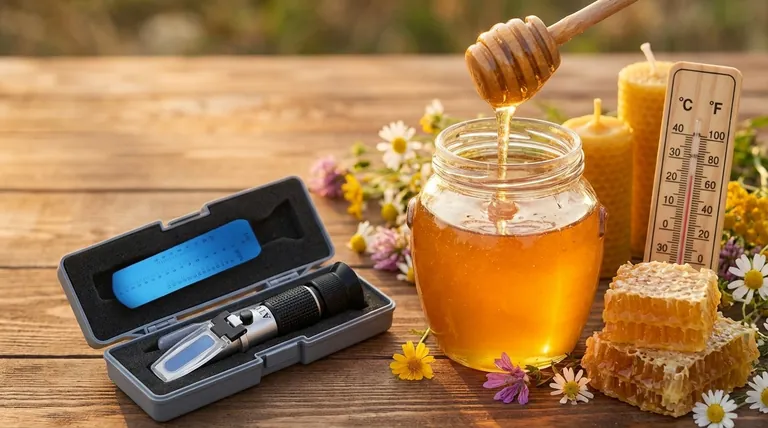
Why Temperature Degrades Honey's Quality
Honey's value extends beyond its sweetness, residing in its bioactive compounds. These compounds are inherently sensitive to their environment, especially heat.
The Role of Natural Enzymes
Enzymes are essential proteins that act as catalysts for various biological processes. Honey contains several important enzymes, such as invertase and diastase, introduced by bees during production.
These enzymes are responsible for some of honey's antibacterial properties and help break down complex sugars. However, like all proteins, they denature—or lose their functional shape—when exposed to high heat. This loss is permanent.
The Impact on Antioxidants and Flavonoids
Honey is a source of antioxidants, including various flavonoids, which are compounds derived from the plants the bees visited. These substances help protect your body's cells from damage caused by free radicals.
Unfortunately, these delicate compounds are also degraded by heat. The higher the temperature and the longer the exposure, the more significant the reduction in honey's antioxidant capacity.
Understanding the Trade-offs in Honey Processing
If heat is so damaging, you might wonder why much of the honey on the market is heated at all. The answer lies in the balance between commercial demands and nutritional quality.
The Goal: Preventing Crystallization
The primary reason for heating honey commercially is to slow down natural crystallization. Heating dissolves the glucose crystals that cause honey to solidify, keeping it in the smooth, liquid state many consumers prefer. It also allows for easier filtering and bottling.
The Consequence: Inevitable Nutrient Loss
This desire for a perpetually liquid product comes at a direct cost. The temperatures used in commercial pasteurization and processing are often high enough to destroy the vast majority of beneficial enzymes and significantly reduce the antioxidant content mentioned earlier.
The "Raw" Honey Distinction
This is why the term "raw honey" is so important. While not a legally regulated term in all regions, it generally signifies honey that has not been heated past hive temperatures (around 95°F or 35°C), thereby preserving its full profile of natural enzymes and compounds.
Making the Right Choice for Your Goal
Your decision on what kind of honey to use should be guided by your primary objective.
- If your primary focus is maximizing health benefits: Choose honey that is explicitly labeled "raw" and "unfiltered" to ensure the enzymes and antioxidants are intact.
- If your primary focus is baking or cooking: The heat from cooking will destroy these delicate nutrients anyway, so using a standard processed honey is perfectly acceptable.
- If your primary focus is long-term liquid storage: Commercially heated honey will resist crystallization longer, but be aware this convenience comes at the cost of its key nutritional benefits.
Ultimately, understanding the impact of heat empowers you to choose the honey that best aligns with your specific health and culinary goals.
Summary Table:
| Nutrient Affected by Heat | Key Function in Honey | Consequence of Heating |
|---|---|---|
| Natural Enzymes (e.g., invertase) | Antibacterial properties, sugar breakdown | Denatures and permanently loses function |
| Antioxidants & Flavonoids | Protects cells from free radical damage | Significant reduction in antioxidant capacity |
For commercial apiaries and distributors focused on quality: Ensure your honey products retain their maximum health value. HONESTBEE supplies beekeeping equipment and supplies designed to help you harvest and process honey with minimal heat exposure, preserving the delicate enzymes and antioxidants your customers value. Contact our experts today to discuss wholesale solutions for your operation.
Visual Guide
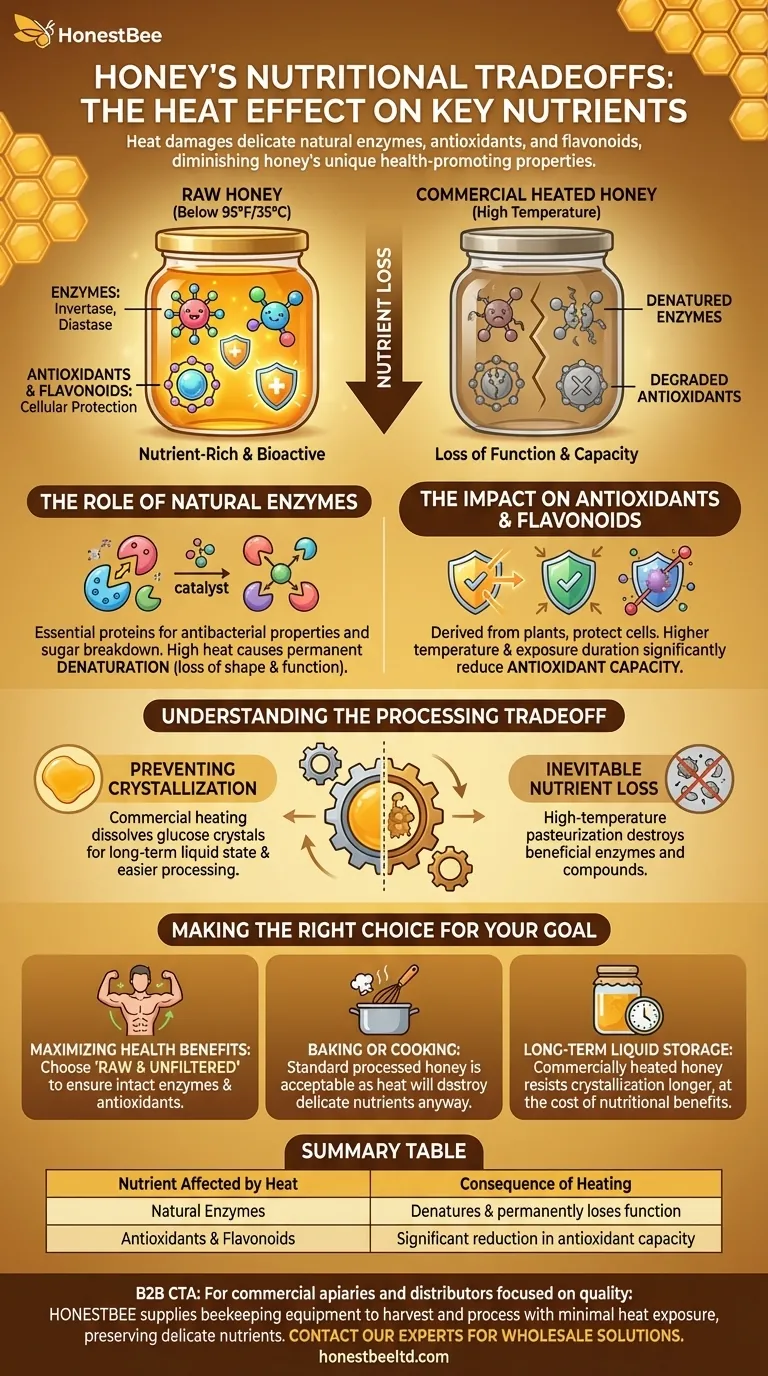
Related Products
- Precision Honey Refractometer Instrument for Quality Assessment
- 10L Stainless Steel Electric Honey Press Machine
- HONESTBEE 3-Frame Manual Acrylic Honey Extractor
- Plastic Hand Crank 2 Frame Honey Extractor Low Price
- 8-Frame Electric Self-Reversing Honey Extractor Spinner for Commercial Honey Extraction Equipment
People Also Ask
- What is the primary role of specialized beehives? Optimize Colony Health & Efficiency
- What role do remote monitoring systems play in the modernization of the beekeeping industry? Drive Precision & Efficiency
- Why must high-precision data logger probes be equipped with plastic protective films? Protect Your Hive Sensors
- What challenges does the improper use of agricultural chemicals pose to honeybee management? Expert Mitigation Tips
- How does steam distillation equipment function? Extract Pure Essential Oils for Honeybee Epidemic Prevention
- Why is a transparent acetate sheet used during localized monitoring of bee cells? Enhance Your Research Accuracy
- Why must industrial-grade low-temperature cryogenic freezers be used for Royal Jelly? Protect Sample Integrity
- Where is the best place to be a beekeeper? Match Your Goals to the Perfect Region
